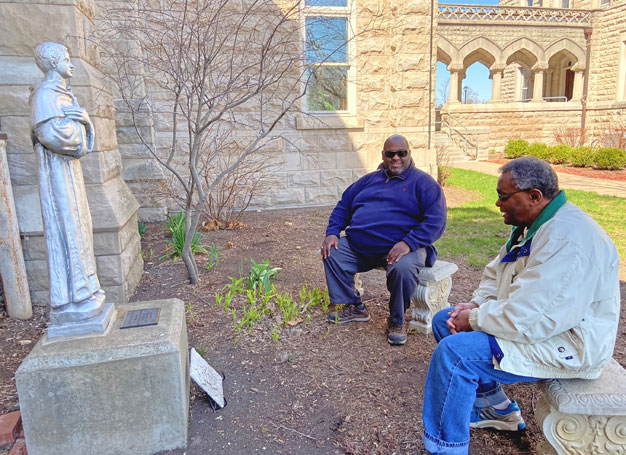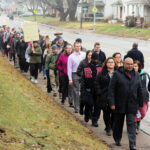
Jim Collins, right, and Thomas Mason IV talk and pray by a statue of St. Martin de Porres outside Sacred Heart Cathedral in Davenport.
By Barb Arland-Fye
The Catholic Messenger
An education bill advancing in the Iowa Legislature would prohibit teaching in government diversity training or a K-12 school curriculum that the “U.S. and Iowa are inherently or systemically racist.” The bill’s proponents assume Iowans agree on a definition of “systemic racism,” but the term might be more nebulous than they realize.
The Catholic Messenger interviewed Black Catholics to share their thoughts on the meaning of systemic racism and how the church, collectively and individually, can work to eliminate it.
Thomas Mason IV leads the St. Martin de Porres Society, founded in 1985 at Sacred Heart Cathedral in Davenport to promote racial unity and Black awareness among Catholics in the diocese. Mason defines systemic racism in this way:
“Systemic racism is evident in homeownership, where lower incomes and higher rates of poverty, combined with difficulties in getting mortgage approval, mean that homeownership rates for Black Americans remain low to nearly unattainable. Systemic racism is evident in employment, where Black Americans are grossly underrepresented in corporate hierarchy. For example, as of 2020, there are only four Fortune 500 companies that have Black CEOs.”
“Systemic racism is evident in education, where school climate is also a factor because Black students need to feel safe and have a sense of belonging. They need to have adults they trust and who look like them at school, as it may affect how well they perform on assignments and standardized tests.”
“Black students are more likely to enroll in honors classes, for instance, if those courses are taught by Black teachers. Studies have also shown that Black and Latino students are also far more likely to attend schools in low-income neighborhoods, which impacts academic achievement, in part because of lack of resources.”
A wedge issue
Jim Collins, a fellow parishioner at Sacred Heart Cathedral and member of St. Martin de Porres Society, offers this definition of systemic racism: “If you are a person of color or different nationality, you are disadvantaged intentionally in your life across institutions and society in areas like employment, pay, housing discrimination, incarceration, etc.”
However, he thinks the term “systemic racism” becomes a wedge between people, which alienates rather than fosters racial equality and justice. “While we all work to level the ‘playing field,’ we have to work towards assuring the dignity of all.”
“My belief is that racial hate and misunderstanding in America has been a part of our history, is in our present and will have a presence in our society as long as we’re here on this earth,” Collins, a retired Deere & Co., executive said. “Sorry, but we are humans and thus imperfect. Therefore, some number of us will continue the sin of hate by race. The answer? What will the rest of us do about it?”
“I have two nephews, both of whom have been pulled over for driving while Black, and even though I have a nodding acquaintance with the police from work, I’m still nervous driving sometimes,” says Andrea Edelen, a Black Catholic and longtime parishioner of Sacred Heart Cathedral. Her father, the late Andy Edelen, co-founded the St. Martin de Porres Society with the late Father Marvin Mottet.
“At church, it’s been a long time since anyone looked twice at me, no matter what parish I go to. That was not the case when my family moved here in the late ‘60s. While we attended Holy Family (in Davenport), my father became one of the first eucharistic ministers, and parishioners would avoid his line so as not to receive Communion from him.”
Nonetheless, Andrea Edelen thinks, “Our church in particular has been very ‘proactive,’ if that’s the correct term, in educating the public about Black Catholics and their role in the history of the church,” she said. “As with a lot of issues involving race, I think education is the key component.”
Tyla Cole, who previously served as archivist for the Diocese of Davenport, says the disturbing video that captured the death of George Floyd while in police custody last year shows that systemic racism continues. For centuries, Black Americans have been left physically, emotionally and economically behind. “It’s not hard to notice since hate crimes, and white supremacist have been encouraged and anti-immigrant rhetoric intensified.”
“Systemic racism is in our schools, workplace, court system, police departments and elsewhere. Why? White people occupy most positions of decision-making power; people of color have a difficult time getting ahead, let alone things being fair. How can we do a better job? Believe that it’s real. Start a conversation and take action,” Cole says.
Engage in conversations
Mason, a technical sales representative, husband and father of three children, says people need to “learn to recognize their own privilege as racial privilege plays out across social, political, economic and cultural environments.” For example, “What messages did you receive as a kid about people who are different from you? What was the racial and/or ethnic make-up of your neighborhood, school or religious community? Why do you think that was the case? These experiences may produce and reinforce bias, stereotypes and prejudice, which can lead to discrimination. Thus, by examining our own biases it can help us work to ensure equality for all.”
He encourages people of faith to “engage in tough conversations about race and injustice. We must not be afraid to discuss oppression and discrimination for fear of ‘getting it wrong.’”
“The best way to understand racial injustice is by listening to people of color,” Mason says. The role of the Catholic Church and the faithful, individually and collectively, to eliminate racism begins with education. “The Catholic Church needs to recognize that racism is present in our everyday life. The Catholic Church needs to educate all Catholics to recognize and understand the contributions of Black Catholics to the church. This includes the teaching of Black saints, reading books calling for unity of Catholics across races, and support for interfaith dialogue to end racism.”
“Catholic leaders also need to draw attention to steps parishioners can take locally, such as supporting the blessing box, contributing to the clothing center, etc., which improves lives in the community. The Catholic Church needs to reinforce through Scripture that God created all human beings equally.”
Finally, as “Pope Francis remarked on the first International Day of Human Fraternity, ‘There is no time today for indifference. Either we are brothers and sisters, or everything will fall apart. Fraternity is the new frontier for humanity on which we need to build; it is the challenge of our century,’” Mason says.
Ideas for moving forward
“I believe that most people, especially those of us of faith, don’t get up in the morning planning how to run our schools, places of work, our communities and society in general to the advantage of some and the disadvantage of others based on race,” Collins says.
“Regretfully, Martin Luther King Jr.’s dream ‘that my four little children will one day live in a nation where they will not be judged by the color of their skin but by the content of their character’ will not be fully realized. However, we can celebrate and use the model of many accomplishments realized in our nation, regional area and specifically in the Diocese of Davenport since his dream speech.”
Collins points to the election of the first Black President; first Black Vice President; Black mayors elected in Iowa in the Diocese of Davenport (Clinton and Iowa City). He referred to Black police chiefs, school superintendent and numerous Black business owners and executives in the Quad-City metro area. He is encouraged by integrated housing throughout the greater Quad-City metro area.
Many people of color paid the price over so many years to achieve the inroads in racial justice, Collins says. It is the role of each individual — regardless of skin color — to uphold God’s instruction: “that I am my brother’s keeper.”
Collins appreciates the U.S. bishops’ most recent pastoral letter on racism, “Open Wide Our Hearts” (2018) and the statements from Bishop Thomas Zinkula, and the story he shared of his family’s experience with racism. Moving forward, Collins offers these seven suggestions for the Catholic Church and the people who comprise it:
1. Learn about other people and their history.
2. Have a conversation with other people on issues of race. Learn about their history.
3. Collaborate with a sister church of another race/culture.
4. Evangelize to integrate our church.
5. Read, read, read.
6. Pray for and support programs in support of the disenfranchised, marginalized and the greater community. The St. Martin de Porres Society, for example, is open to all the faithful in the Diocese of Davenport. Contact thomasmason1928@gmail.com for more information.
7. Pray, pray, pray. “We have a statue of St. Martin de Porres on the campus of Sacred Heart Cathedral. This is here for anyone to sit and meditate, to pray for racial unity in our community.”











